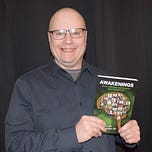
There has been a great deal going on lately with regards to mental illness. Some believe it has been worse than ever because more people are feeling okay about admitting they have a mental illness. I hate to say it, but when I was younger, I knew a certain person who was able to work but didn’t, and talked often about how he would go onto disability supports and how many benefits this would give him. Fortunately, he didn’t end up getting supports and managed to find work. Even in my own situation, where I have a serious mental illness, with not only symptoms of bipolar and schizophrenia, but also I have to live with the side effects of many medications. As I will mention in this podcast, my line of work that suited me best was being a security guard. The work wasn’t difficult until you had learned enough about the job to be effective in any high-profile situations, and I had a lot more respect for myself knowing I was at least working all I could to support myself. There is also the factor that if I ever wanted to get into an adult relationship, I would not have nearly as many options if I was unemployed.
Something I wanted to talk about today is not just the rising tide of mental illness sweeping across North American societies, but also how they are responded to. Due to the nature of schizophrenia, an interaction with the police can be one of the first instances of exposure to possible treatment that people with this mental illness have.
Among the symptoms of schizophrenia, there are positive and negative symptoms. These are things added, or things taken away. What one loses, or has taken away, are things like their ability to form relationships, to maintain proper hygiene, and to lose ambition. The positive symptoms mostly focus around delusions (thoughts, ideas that you experience that no one else does) hallucinations (things you see, hear, taste, touch that others don’t experience) and paranoia (an irrational fear, sometimes severe that others will harm you or that you are constantly in danger). When someone experiences these symptoms as I did, you have ideas in your head that you are perhaps rich and powerful. Then you misinterpret things as simple as a smile, a bird landing, or making eye contact with messages and signs that your false ideas are real. In my case, my paranoia made me fear that if I talked about my illness that the others who helped me to become rich and powerful would see this as a betrayal and kill me.
I was incredibly sick and had no idea that I had any kind of an illness. How does a person deal with not trusting what their own mind and senses tell them? This deficit of self-awareness is known as anosognosia. I was so deep into my psychosis that I created a scene after being assaulted by my sister’s boyfriend at the time. I was so irrational, police were called, there was no choice. Perhaps even worse was the fact that no one understood anything about schizophrenia except maybe my parents, who I wasn’t on great terms with. Though they did rough me up a fair bit, if the police hadn’t been there to forcibly take me to a hospital, things could so easily have ended up worse than they did.
Another thing that is almost frightening is that in the US, the largest provider of mental health services is the county jail system. This means that if you have an illness, your best hope is to commit a crime and be jailed so you can receive medications and consult with a psychiatrist. I actually know a woman who was praying her son would commit a crime because he was homeless, abusing drugs and wasn’t even in contact with her.
As a result of deaths of people, often black people, by police using lethal force, many have called for the defunding of police and for the money to go to actual methods that help solve the problems not just empower police to use any force they deem fitting. I have to say that I am not a huge supporter of this, but I do empathize with the families of people like George Floyd who have been killed by police. What we need are sweeping reforms, and a lot of community-based education and organization. Perhaps in the future, every community that is affected by crime can stand together and replace the need for police. But the way things are now, I can only see the situation escalating into chaos. I found a video by a Canadian news organization that explains the current outcry to defund the police, simply click on it to watch the video. (Please note this is a 4-year-old video, but an informative one)
One thing I find interesting is how this video explains that the police are something of a tool of the government to use violence to control the population. In Canada it seems to me that Police are so much more than just their gun or badge, they are intelligent, well-trained people who respond much more to situations needing advice and support and access to things like mental health care or family intervention than they respond in any way with violence. But even with that, in a way I feel like I have been programmed to think that way.
For example, I have two favourite shows that I watch a lot of. One is Law and Order, the 20-season TV series about cops and district attorneys. I even met a real homicide detective who told me he watches the show as well, though he didn’t find it to be terribly accurate. The kind of police work he did took months or even years to get through an investigation, court dates, prosecution and all that. But the thing was, although I don’t have a paranoid fear that the government is controlling my thoughts, there is a lot of power in broadcasting a high-budget show that is top of the ratings, that basically promotes and puts in a good light, two detectives, two lawyers and a district attorney. The other show I watch is Gunsmoke. I watched an interview with the show’s star (it also ran for 20 seasons) James Arnes, and he said that one of the stipulations in making the show was that, as Marshall, he had to follow the letter of the law in every show. Watching the above video really made me think about the possibility of viable options to policing. The big question is still, are we ready for such a move, or are there other things we can do to lower crime rates, reduce the gun violence and such. I personally think if you lowered homelessness, mental illness, addiction, and poverty, crimes would go down greatly, but then what would the communities be subject to?
One thing I am thinking is, if you defund the police in a city, then organized crime will move in and end up making the situation much worse. If you do it across a country, the place will become a magnet for criminals. One counter-argument to that is when I was reading about a character in a novel who was a career criminal who moved to England because he knew he would eventually be arrested, but the police there didn’t carry guns. I think we could learn a great deal from England in this respect. Again, on another note, I had a book from Britain that talked about self-defence, and it stated that if you live in London, you have something like a 1 in 3 chance of being assaulted at some point.
Well good readers (and good listeners) I will stop at that point. I hope that if anything, I have made some of you stop and think. Please leave a comment in the chat what you thought of this blog/podcast and if there are any topics you would like to see me cover (please be specific. what I don’t know, I will research).














Share this post